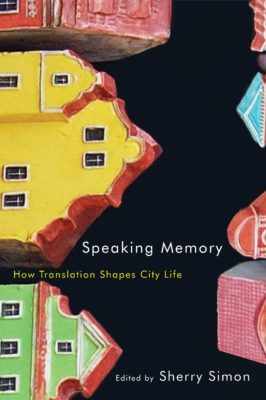Speaking Memory: How Translation Shapes City Life, edited by Concordia University professor Sherry Simon, collects scholarly perspectives on the multilingual city, ranging from historical and political to activist and creative points of view. Readers in Montreal will empathize with the idea of a city that operates on more than one linguistic plane, with vastly disparate lingual experiences and narratives that coexist and interact, and the disenfranchisement that can occur when languages are in conflict. Whereas the polylingual city is often coded as positive, as a vibrant, multicultural arena, these essays highlight that it also exists in a constant state of translation, with the concomitant potential of mistranslation, misrepresentation, and even suppression. As Simon summarizes, “Multilingualism points to pure diversity, the number of languages spoken, but translation speaks to the relations of tension, interaction, rivalry, or convergence, among them as well as the particular spaces they occupy in the city.”
This is a substantial volume with a wide spectrum of essays and it is impossible to do justice here to each author and argument; however, the book is structured around three main concerns. In the first section, various multilingual cities – Vilnius, Trieste, Prague, and urban spaces during the Habsburg reign – are studied as geographical palimpsests, considering the layers of linguistic memory that grow over, replace, and compete with one another. For example, Vilnius, the capital city of Lithuania, has, over time, been baptized as Wilno, Wilna, Wilda, Vilna, Vilno, and Vilne. As Laimonas Briedis writes, it is “a place of runaway translations.” These names represent the city’s history of violence, colonization, war, and religious antagonism. A useful dichotomy for reading multilingual cities is the coexistence of horizontal and vertical translations – whereas the former embraces the intersection of languages, of Babylonian multiculturalism, the latter unearths the painful memories of dissent inherent to linguistic plurality, thereby defining the fraught identity of a city like Vilnius.

Speaking Memory
How Translation Shapes City Life
Edited by Sherry Simon
McGill-Queen's University Press
$34.95
paper
328pp
9780773547896
The final section explores what Simon calls “the generative powers of multilingual milieus,” such as New Orleans, Montevideo, São Paolo, and Montreal. This section studies the multivocal literature and art inspired by the gap between coexisting languages, bridging the variety of rhythms and textures present in pluralistic urban spaces. Andre Furlani’s concluding essay, for instance, absorbs the democratic texture of different languages on a walk through Montreal; the excursionist experiences language, but never stops to listen, compare, and impose interpretation.
Overall, Speaking Memory is a well-researched and engaging anthology intended primarily for an academic audience. While the subject matter is at times restricted to a small niche of inquiry, the scope of the collection is ambitious, emphasizing the omnipresence of language and the fact that it is truly a central force when it comes to experiencing the multiplicity of the city. Language translates the city.






0 Comments